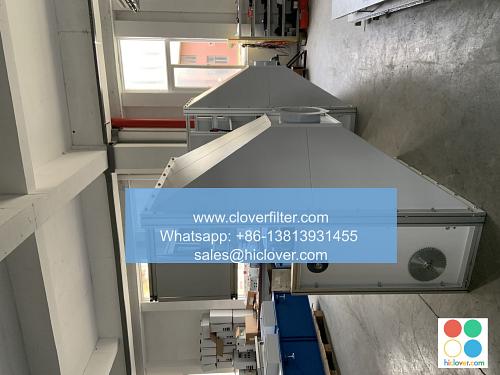Automatic Roll Air Filters: A Crucial Component in Vaccine Lab Air Quality Control

As the world continues to grapple with the challenges of pandemics and infectious diseases, the importance of vaccine development and production cannot be overstated. Vaccine laboratories play a critical role in this process, and maintaining optimal air quality is essential to ensure the integrity and efficacy of vaccine products. One key component in achieving this goal is the use of automatic roll air filters, which have become a staple in vaccine lab air quality control.
Introduction to Automatic Roll Air Filters
Automatic roll air filters, also known as roll filters or automatic roll media filters, are designed to provide high-efficiency air filtration in vaccine laboratories and other controlled environments. These filters use a continuous roll of filter media, which is automatically advanced as the media becomes saturated with particles and contaminants. This self-contained system ensures consistent and reliable air filtration, minimizing the risk of contamination and maintaining optimal indoor air quality (IAQ).
Key Applications in Vaccine Labs
Automatic roll air filters have a wide range of applications in vaccine laboratories, including:
* Vaccine production areas: These filters are used to maintain sterile environments and prevent contamination of vaccine products.
* Research and development laboratories: Automatic roll air filters help to maintain optimal air quality and prevent the spread of microorganisms and other contaminants.
* Quality control and testing areas: These filters ensure that airborne particles and microorganisms do not compromise the accuracy of test results.
* Animal research facilities: Automatic roll air filters are used to maintain animal health and prevent the spread of zoonotic diseases.
Benefits of Automatic Roll Air Filters
The use of automatic roll air filters in vaccine laboratories offers several benefits, including:
* Improved indoor air quality: These filters effectively remove particulate matter, microorganisms, and other contaminants from the air.
* Reduced risk of contamination: Automatic roll air filters minimize the risk of contamination and ensure the integrity of vaccine products.
* Increased efficiency: These filters are designed to provide continuous filtration with minimal maintenance requirements.
* Cost savings: Automatic roll air filters can help to reduce energy costs and extend the life of HEPA filters and other downstream filtration systems.
Selection and Installation Considerations
When selecting and installing automatic roll air filters in vaccine laboratories, several factors must be considered, including:
* Filter efficiency: The filter must be able to capture 99.97% of particles as small as 0.3 microns.
* Airflow rates: The filter must be able to handle the required airflow rates to maintain optimal indoor air quality.
* Filter media: The filter media must be compatible with the laboratory’s chemical and biological agents.
* Installation and maintenance: The filter must be easily installable and require minimal maintenance to ensure optimal performance.
Conclusion
In conclusion, automatic roll air filters are a crucial component in vaccine lab air quality control, providing high-efficiency filtration and minimizing the risk of contamination. These filters have a wide range of applications in vaccine laboratories, including vaccine production areas, research and development laboratories, quality control and testing areas, and animal research facilities. By selecting and installing the right automatic roll air filter, vaccine laboratories can ensure optimal indoor air quality, reduce the risk of contamination, and maintain the integrity of vaccine products. As the demand for vaccines continues to grow, the importance of automatic roll air filters in vaccine lab air quality control will only continue to increase.

